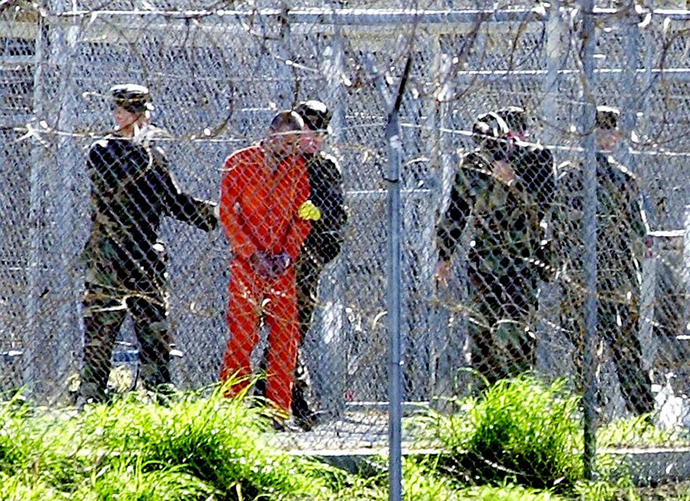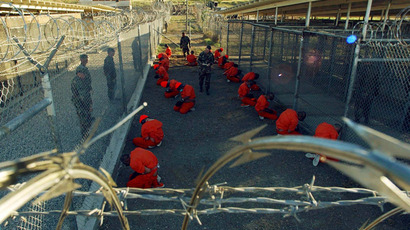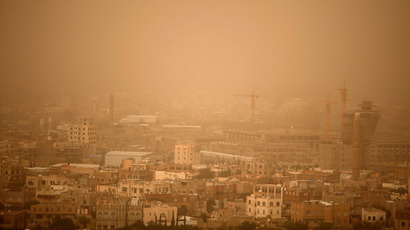‘US support for human rights merely a show’ – relatives of Yemeni Gitmo detainee
As the Guantanamo hunger strike enters its 120th day, the US House of Representatives has voted to keep the notorious detention center open in Cuba, blocking the use of taxpayer money to house any detainees transferred out of the prison.
Follow RT’s day-by-day timeline of the Gitmo hunger strike.
Although President Barack Obama said last month that he was
determined to close the facility, where over 100 inmates have
been on hunger strike since early February, the recent vote
upheld a law blocking the use of taxpayer funds to build or
renovate facilities in the US to house suspected terrorists and
other prisoners from Guantanamo Bay.
Obama first promised to shut down Guantanamo in 2008. Since then,
relatives of detainees have held out hope they would be reunited
with their husbands, brothers and sons. One family of a Yemeni
inmate told RT's sister channel Russia Al Youm it is unlikely
they would ever see their loved ones ever again.
Obama’s recent promise to lift restrictions on Yemeni Gitmo
detainees was greeted with sneers in the country. “America’s
support for human rights is merely a show! It only cares about
its own people, while it destroys the rights of all others. We’ve
been suffering for 13 years now,” the mother of Abdurrakhman
ash-Shbaty, a Yemeni terror suspect kept at the controversial
detention center since 2002, told Abdelaziz Al Khayajim.
And after ash-Shbaty was arrested, his entire family was accused
of terror links. “We’re tired of these nonstop lies. Obama
remembers about Guantanamo only during election campaigns and on
holidays. He promised to shut it down several times and to
forward their cases to their home countries. These are all lies,”
ash-Shbaty’s brother said.
In May, President Obama announced he was lifting his self-imposed
ban on transferring Guantanamo detainees to Yemen, despite
reports that detainees returned to Yemen have joined terrorist
fighters in the Arab nation. These security concerns prompted
Obama to suspend transfers to Yemen in 2010 after a Nigerian man
attempted to blow up a US-bound flight on Christmas Day 2009 with
explosives hidden in his underwear on instructions from Al-Qaeda
operatives in Yemen.
According to Yemen experts in the US, security in the country has
improved since last year’s ouster of authoritarian leader Ali
Abdullah Saleh. In an effort to combat terror, his successor Abed
Rabbo Mansour Hadi has restored cooperation with the US. Yemen is
also demanding $20 million from Washington to build a rehab
center for former Guantanamo detainees extradited to the country.
The facility’s program would ostensibly discourage them from
returning to militant activities.

Last month, Amnesty International listed the indefinite detention
of 166 prisoners at Guantanamo as America’s primary human rights
concern in the US chapter of its annual report for 2012. The
human rights group has also kept count of the death toll at
Guantanamo: “Adnan Farhan Abdul Latif, a Yemeni national who
repeatedly expressed distress at his indefinite detention without
charge or trial, died during the year, bringing to nine the
number of detainees known to have died at Guantanamo since
January 2002,” the report said.
Latif, one of the first Gitmo prisoners, was taken into US
custody in 2001. His release was ordered by the US District Court
in Washington in July 2010, but the decision was overruled a year
later on the grounds that Latif was an Al-Qaeda combatant.
Less than a week ago, the protesting Guantanamo detainees issued
a plea urging the US Military to appoint a new team of physicians
to oversee their care during the hunger strike, which currently
involves 8 of every 10 prisoners.
A letter dated May 30 and signed by nine Gitmo detainees and the
attorneys for several others was “respectfully requesting that
independent medical professionals be allowed into Guantanamo” to
treat the detainees, and that they be given full access to their
medical records in order to determine the best treatment.
Nearly 40 of the hunger strikers are reportedly being force-fed,
which they claim is a form of torture. “They are close enough to
death that the military sees the need to force-feed them, but
none of them enjoy being force-fed, I can tell you that. And
they’ve described being force-fed as having a knife run down
their throat,” human rights lawyer David Remes said.
While Gitmo prisoners say they cannot describe how painful
force-feeding is, the detention facility’s staff maintain that
the “detainees in the hospital do not currently have any
life-threatening conditions.”
“We have a detainee population of 166, and we currently have
103 detainees tracked as hunger strikers, with 37 receiving
enteral feeds. Two detainees receiving enteral feeds are being
observed in the detainee hospital,” according to the latest
report from Guantanamo Bay officials.














